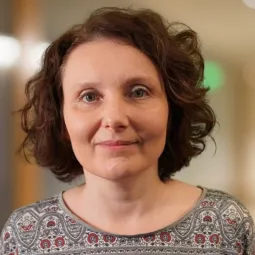
Justyna Deszcz-Tryhubczak is an associate professor of Literature at the Institute of English Studies, University of Wrocław, Poland. She is the co-editor (with Zoe Jaques) of Intergenerational Solidarity in Children’s Literature and Film (2021), (with Irena Barbara Kalla) Children’s Literature and Intergenerational Relationships: Encounters of the Playful Kind and Rulers of Literary Playgrounds: Politics of Intergenerational Play in Children's Literature (2021), and (with Macarena García-González) Children’s Cultures after Childhood (2023). In 2017-2021, she served on the board of the International Research Society for Children’s Literature. In the years 2018-2024 she was the University of Wrocław coordinator of the Erasmus Mundus International Master: Children’s Literature, Media, & Culture.
Reading for Pleasure in the Anthropocene
The Anthropocene – the state of risk and emergency marked by our growing awareness of the unhopeful future of humanity and the world – has put educational theory and practice on the spot. There is no doubt that they cannot continue with business-as-usual but need to help us all navigate the intellectual, affective, and ethical challenges of living on the damaged planet. Drawing on the work of colleagues, among others, who have critiqued anthropocentric practices of reading (e.g. Errázuriz and García-González 2021, de Rijke, Osgood and Laura-Rosa 2023), as well as on posthuman literacies (e.g. Murris and Somerville 2022) and the work of the Common Worlds Research Collective (e.g. Taylor and Pacini-Ketchabaw 2019), I invite speculation on re-imagining reading for pleasure away from its focus on the all-too-human goals of individual agency, progress, and socioeconomic success, which seem to be dead ends in this era of uncertainty. I suggest that it become a practice committed to a pleasure derived from our sense of interconnectedness with and participation in more-than-human communities (Alaimo 2016). I conclude with a reflection on what such a reconceptualisation could mean for Reading Teachers (Cremin et al. 2023).